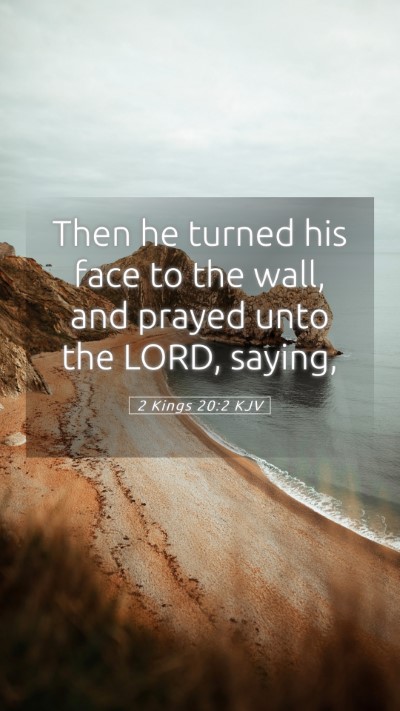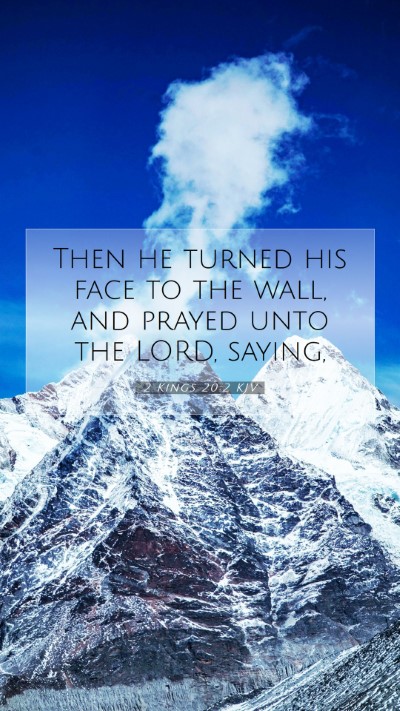Old Testament
Genesis Exodus Leviticus Numbers Deuteronomy Joshua Judges Ruth 1 Samuel 2 Samuel 1 Kings 2 Kings 1 Chronicles 2 Chronicles Ezra Nehemiah Esther Job Psalms Proverbs Ecclesiastes Song of Solomon Isaiah Jeremiah Lamentations Ezekiel Daniel Hosea Joel Amos Obadiah Jonah Micah Nahum Habakkuk Zephaniah Haggai Zechariah Malachi2 Kings 20:2 Meaning
What is the meaning of 2 Kings 20:2?
Then he turned his face to the wall, and prayed unto the LORD, saying,
2 Kings 20:2 Bible Verse Meaning
2 Kings 20:2: Understanding the Verse
The verse in 2 Kings 20:2 portrays a significant moment in the biblical narrative concerning King Hezekiah's life, his health crisis, and the response from God through the prophet Isaiah. This summary combines insights from various public domain commentaries to provide a comprehensive interpretation.
Verse Analysis
2 Kings 20:2 states: "Then he turned his face to the wall, and prayed unto the LORD."
This action described by Hezekiah holds deep meaning. It signifies desperation, humility, and a fervent plea for divine intervention. Below are insights from prominent commentators:
- Matthew Henry: He emphasizes that Hezekiah’s turning towards the wall illustrates his focus on God rather than on the worldly concerns around him. It symbolizes a direct approach to God in his time of trouble, implying that those who seek the Lord must do so with earnestness and sincerity.
- Albert Barnes: Barnes notes the significance of praying "unto the LORD" and highlights this as an acknowledgment of God's sovereignty and power. He also explains that Hezekiah's wall is a barrier that signifies the king's separation from earthly concerns, indicating the sincerity of his prayer.
- Adam Clarke: Clarke explains that Hezekiah's action of turning to the wall represents a figurative display of mourning. He reflects on the concept of faith demonstrated by the king, believing that God could alter his fate through prayer, illustrating a profound act of trust in the divine.
Thematic Insights
This verse encapsulates several themes essential for Bible study groups or theological discourse:
- The Power of Prayer: Hezekiah's plea emphasizes the strength and necessity of prayer in times of crisis. It serves as an example for individuals looking to deepen their understanding of how to interpret Bible verses related to divine communication.
- Desperation and Hope: The act of turning to the wall represents a move from despair to hopeful supplication. This transition highlights the importance of approaching God with vulnerability and honesty.
- Divine Intervention: The overall context of this passage serves as a profound example of God's willingness to listen to the prayers of His people and respond according to His will, reinforcing the belief that prayer can lead to miraculous outcomes.
Application of the Verse
When looking for the application of this passage, it is essential to assess how these themes resonate with modern life:
- Understanding the role of prayer in personal struggles can guide individuals towards seeking divine assistance actively.
- The need for humility when confronting life’s challenges is underscored through Hezekiah’s example, reminding us to turn away from distractions and focus on God.
- Acknowledge God's will in our lives, which may not always align with our desires but is ultimately for our good and His glory.
Related Scripture References
- Isaiah 38:1-5 - This passage provides additional context regarding God's message to Hezekiah and his healing.
- Psalm 30:2 - Reflects themes of healing and deliverance, resonating with Hezekiah’s experience.
- James 5:15 - Encourages prayer as a means of healing, much like Hezekiah's actions in this verse.
Conclusion
2 Kings 20:2 serves as a lesson in the importance of turning to God in earnest prayer during times of distress. The rich commentaries from Matthew Henry, Albert Barnes, and Adam Clarke provide diverse yet harmonious insights that facilitate a deeper understanding of this scripture. For those engaging in Bible study lessons or looking for biblical exegesis, this verse demonstrates the powerful intersection of human need and divine response.


